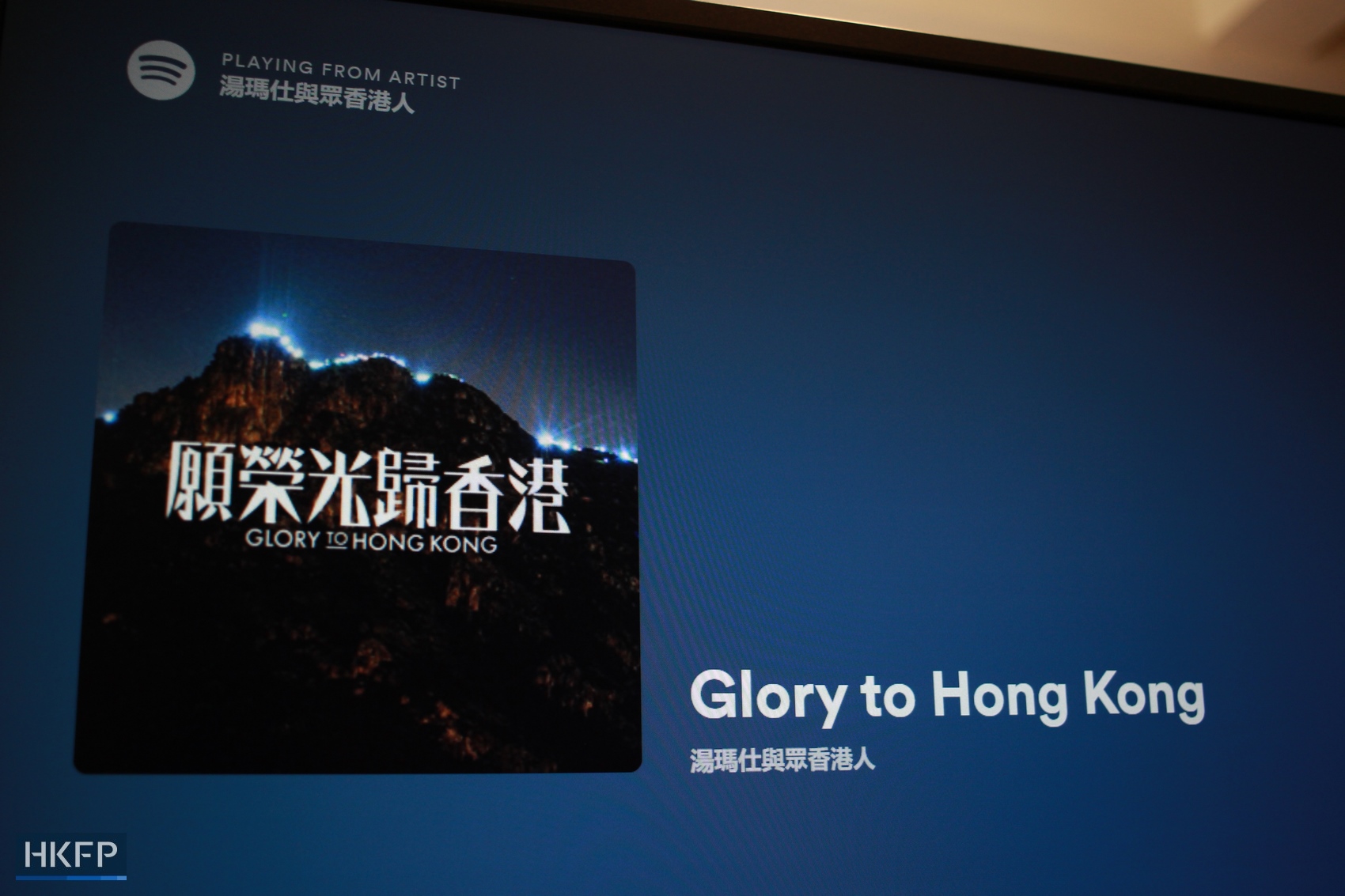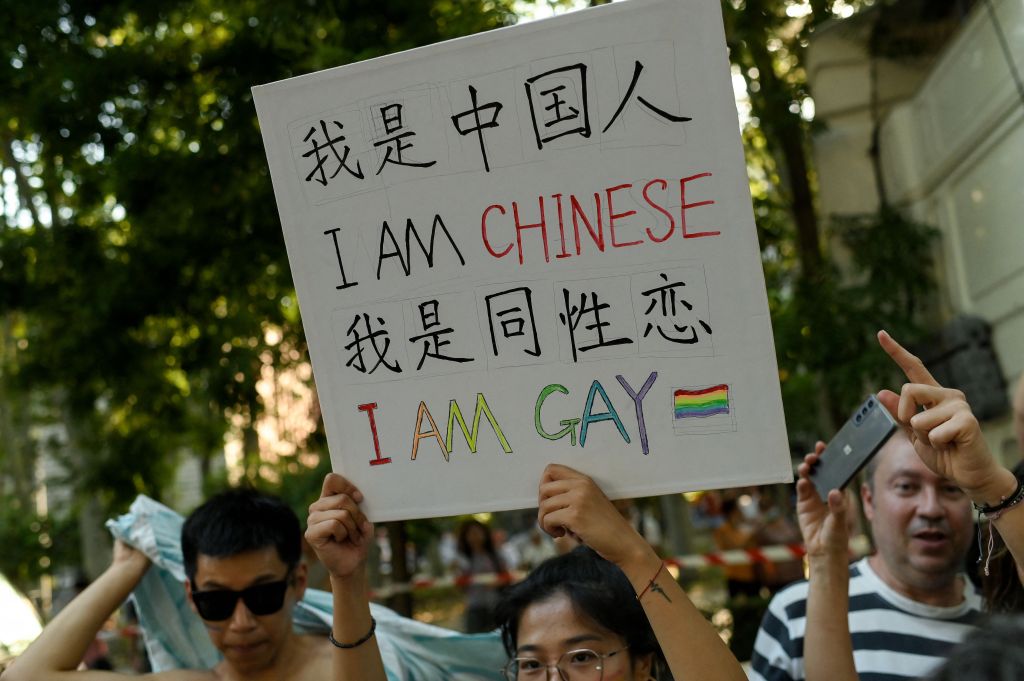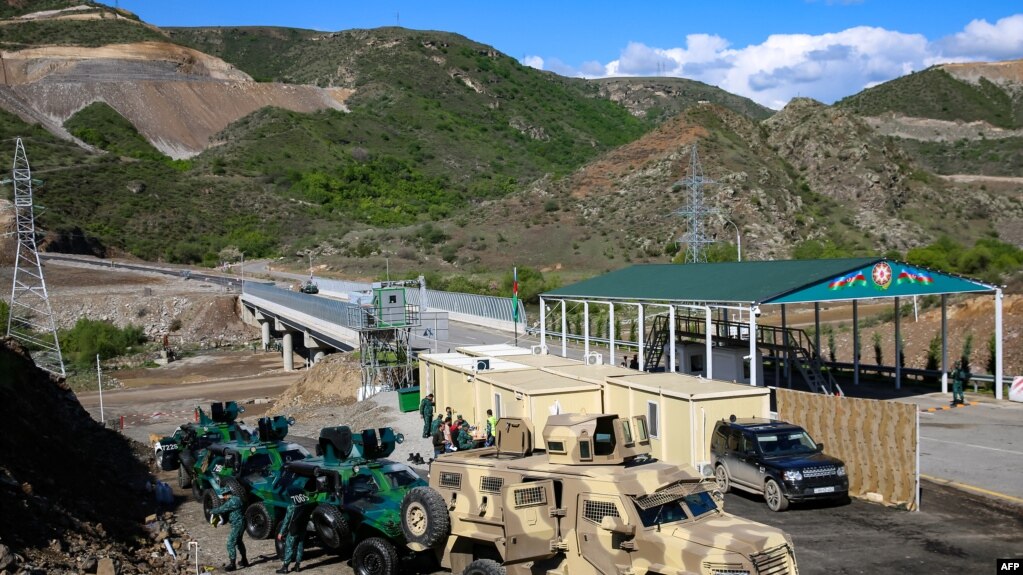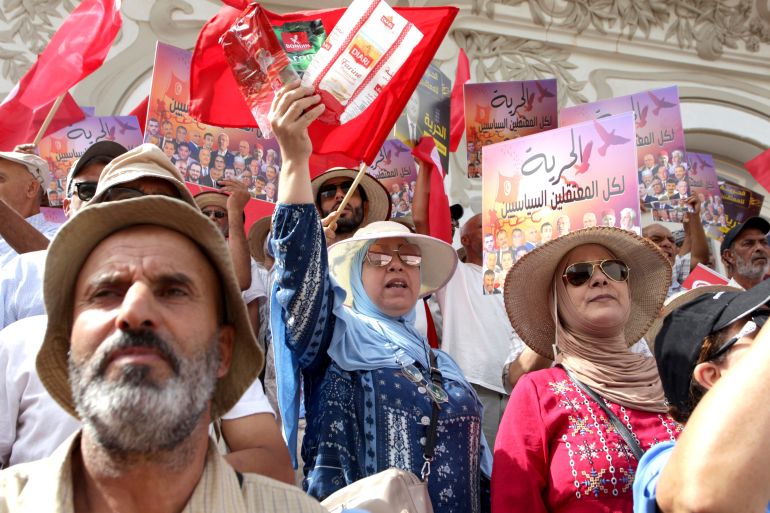
This photo dated June 7, 2023, shows the 2019 protest song “Glory to Hong Kong” on streaming platform Spotify. Photo: Kelly Ho/HKFP.
The original version of this report was written by Candice Chau and published in Hong Kong Free Press (HKFP) on July 28, 2023. The following edited version has been published on Global Voices as part of a content partnership agreement with HKFP.
Hong Kong’s High Court rejected a government bid to ban people from performing or playing the pro-democracy protest song “Glory to Hong Kong” with illegal intentions, saying such a move could have a “chilling” effect on freedom of speech.
Judge Anthony Chan said in his ruling on July 28, 2023, that he was not “satisfied” that it was “just and convenient” to grant the government’s request for an injunction.
The Department of Justice (DoJ) made the move following several mix-ups at international sporting events, when organisers relying on Google searches mistook the protest song for the official national anthem, China’s “March of the Volunteers.” The DoJ sought to bar the distribution of the pro-democracy protest song with the intention to incite secession, sedition, or violate the national anthem law. The government also sought to bar anyone from assisting with those acts.
But the court raised concerns over the “chilling effects” a ban would bring. Chan's ruling stated:
Given that the Injunction is aimed at criminal acts but not lawful activities, I believe that the intrusion to freedom of expression here, especially to innocent third parties, is what is referred to in public law as ‘chilling effects’.[…]
With respect, I am unable to agree that the chilling effects may be dismissed simply because the Injunction is not aimed at lawful pursuits.
“Perfectly innocent people” might refrain from engaging in lawful acts involving the song “for fear of trespassing the injunction, which has severe consequences,” the judge ruled.
The injunction bid had sparked concern among some about the potential implications for free speech. Hong Kong, unlike the rest of China, does not censor the internet despite a sweeping Beijing-drafted national security law (NSL) passed in June 2020.
City authorities previously urged Google to adjust its search results for “Hong Kong national anthem” so that they displayed the official anthem, but the US tech giant said it needed proof that the protest song was illegal.
The lyrics of “Glory to Hong Kong,” a song popularised during the 2019 extradition bill protests, contain the phrase, “Liberate Hong Kong, revolution of our times,” a slogan that was ruled to be capable of inciting secession during the city’s first national security trial.
Hong Kong already has a law criminalising insults to China’s national anthem or flag but said the injunction against the protest ballad was also necessary.
The justice department said in June the song was “likely to be mistaken as the national anthem” and that its existence could suggest that the city has an anthem of its own or could encourage others to commit seditious acts. Injunctions would protect the national anthem from insult, it added.
But the High Court said an injunction would not be of much use and could conflict with existing laws. The court could not see how the injunction would have helped enforce the law, despite the justice secretary’s earlier argument that it would provide an alternative route for the government to consider using, the ruling said. The ban would also be in conflict with criminal law, raising concerns over matters including potential double jeopardy.
While there was a limited prosecution period for sedition offences, there was no such limitation for civil contempt proceedings. If the injunction were granted, it would “have the effect of overriding the prescribed periods,” which was a matter for the legislature, the judge said.
However, the judge added that if the injunction had “real utility” and was not in conflict with criminal law, he would have granted the government’s application despite the chilling effects:
I am unable to accept as a valid answer to these concerns the [secretary for justice’s] submission that it is legally permissible for him to choose the enforcement means that best facilitate the protection of national security.
The judge also refuted the justice minister’s argument that there should not be concerns over potential double jeopardy since the court would have the power to stay any proceedings “which would constitute an abuse of its process.” Chan said in his judgement:
The power to stay proceedings is discretionary, whereas the right of a convicted person not to be subject to double jeopardy is the rule of law.
The High Court judge also said that the evidence submitted by the secretary for justice “contained little in terms of specificities on how the Injunction would e.g. reduce the prevalence of the Song”, as lawful activities were not targeted.
The injunction would also not ease the government’s request to internet providers to remove the song, as there was “no reason to believe” that the providers were “not aware of their duties to act within the law.”
The tech giants would also have access to legal advice if they had any doubts, Chan said, and it was “difficult to understand what the Injunction may add to the deterrence of the criminal law.”
‘Very reasonable’
Ronson Chan, chairperson of the Hong Kong Journalists Association, said he thought the ruling on Friday was “very reasonable.” The HKJA chair said:
I agree with the court and the judgement saying that chilling effect will keep innocent people from lawful actions [to] keep away from the injunction.[…] I think that the judgement is very reasonable, and HKJA welcomes it.
Ronson Chan added that he had “no idea” what the government would do when asked if he expected an appeal from the administration.
“Glory to Hong Kong” was released on YouTube by a local songwriter, identified only as Thomas, and his team, on August 31, 2019 — during the height of the citywide pro-democracy demonstrations and unrest.
It featured lyrics co-written by internet users on the discussion forum LIHKG. They called for democracy and freedom and included the now-banned slogan “Liberate Hong Kong, revolution of our times.”
The government has refused to say whether “Glory to Hong Kong” is illegal when asked by HKFP, despite the authorities’ insistence that the law is clear. Nevertheless, the recent effort to ban all forms of the song was preceded by other legal moves and arrests.
Earlier this month, 27-year-old photographer Cheng Wing-Chun became the first person convicted under the city’s national anthem law. He was sentenced to three months in prison after replacing “March of the Volunteers” with “Glory to Hong Kong” in a video.



 Screenshot comparisons of the edited footage (left) and the original AFP video (right)
Screenshot comparisons of the edited footage (left) and the original AFP video (right)










